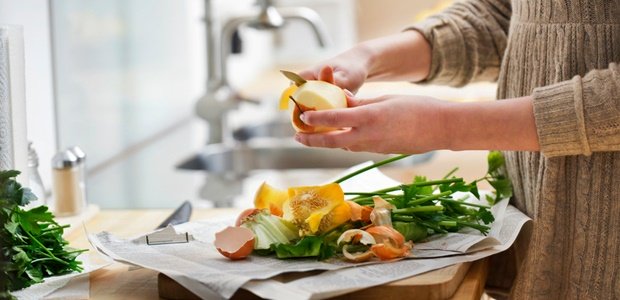(image: iStock)
“Zero waste” is the latest buzz word and some of the most dedicated adherents can store all their waste for a year in one glass jar. I think we can all agree that reducing our waste is not only good for the planet but also good for our health.
Reducing plastic packaging and eating fewer processed foods can only be a good thing! Refusing over-packaged items will also save you money. It may be difficult to implement every single one of these suggestions all at once, but the first step is rethinking.
If any of the steps are too difficult, no one will ever start to use them, so find easy ideas that you can achieve to start!
Where we used to have the three Rs we now have the big five Rs:
1. Refuse
2. Reduce
3. Reuse/repair
4. Recycle
5. Rot
1. Refuse
When you shop, start by simply refusing additional packaging. An easy way to get going on this journey is to take your own reusable bags for packing fruit and veg instead of using those flimsy plastic bags that end up in the ocean masquerading as jellyfish. Also, stock up on reusable shopping bags and say no to plastic straws, toothpicks, anything individually packed or disposable. Buy a travel coffee mug and a glass water bottle and use them.
Say no to free stuff!? Wait, what!
My mom always takes a few spare sugar bags from coffee shops and feels like she is winning, but by accepting “free stuff” we are supporting the production of those items. Even items like free pens or fridge magnets are likely to end up in a landfill sooner rather than later.
Vote with your money, by supporting shops and businesses that use less packaging. Consider supporting your farmer’s market or a zero waste store:
Zero waste store (to be found at various Cape Town markets)
Shop Zero (Opening in November, they will be launching their crowdfunding campaign soon)
Waste free food and Lifestyle Co-op (to be found in Glencairn)
Take outs from Nature (Zero waste shopping experience Somerset West)
2. Reduce
Simplify your life and simply buy less stuff. Start in your kitchen by planning your meals for the week, and purchasing only what you need. That way, you will reduce your food waste each week; remember to eat your leftovers too!
Consider replacing expensive and possibly dangerous cleaning chemicals with vinegar and baking soda. Where possible start making your own processed products. For example, making your own baked goods, preserves and pickles will greatly reduce the need for packaging. A tip from Simon Gear’s book “Going Green”: try buying the most expensive type of paper towel. It will seem less “disposable” to you and you will use it more sparingly.
3. Reuse/repair
Phase out single-use items in your kitchen, such as paper towel, paper napkins, tin foil and cling-film and consider replacing them with cleaning cloths, cloth napkins and storing your foods in glass bottles. Save glass jars when you get them, by washing them out well they can be used over and over.
Top tip: If you want to make preserves in previously used bottles, you will need to purchase new lids. Where possible repair items instead of trashing them. Many appliances are made to be “disposable” so when you buy a new appliance find out what kind of guarantee the company offers. Purchase rechargeable batteries and reuse packaging that you do have by donating it to schools for art projects for reuse before it ends up in the landfill. Many schools also collect bread tags and other items for fundraising.
4. Recycling
Of course, recycling is better than simply disposing of items, but it should be the last resort after all other options have been exhausted. When shopping, make sure you do select recyclable items, check the packaging to make sure that it can be recycled. If you have a “must have” single-use item (form me it if coffee pods) make sure your brand can and will be recycled and how to do that.
5. Rot
Last but not least, my favourite of the Rs. Kitchen waste can be used to make compost, in a worm farm or in a bokashi digester. The bokashi digester will break down all kinds of food waste including bones and other meat products. The by-products of these can be used in your garden. It is tempting to think that food waste sent to the landfill would eventually break down and rot, however that is not the case. Because municipal waste is compacted in the truck, it doesn’t enter a breakdown process because there is no space for water and bacteria to circulate between the layers resulting in little or no breakdown. By adding food waste (which can easily be dealt with in a composter) to the landfill, we are filling up our landfills unnecessarily instead of only putting items there that cannot be disposed of in any other way.
Have your own tips on managing waste? SHARE them with us below in the comments section or email us!
17 Clever ways you can save water in your kitchen right now
As water restrictions in the Western Cape become even more severe, we are reminded again that South Africa is a water scarce country and we are ALL responsible for using water with care. ALSO READ: 10 Ways to lower your electricity bill when cooking It is important to save water in your own home but also important to be mindful of the bigger picture.

